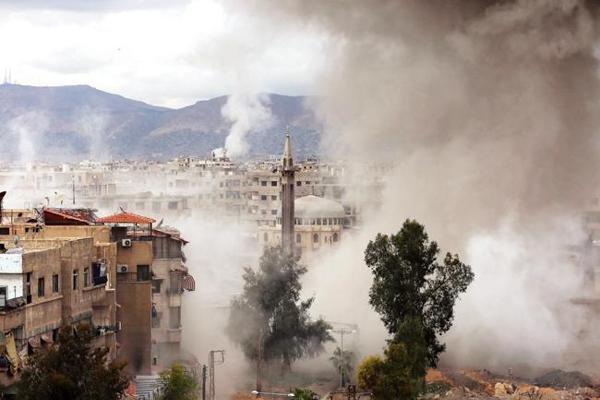Turkey calls on Russia, Iran to stop regime attacks in Syria’s Ghouta
ANKARA


Turkish Foreign Minister Mevlüt Çavuşoğlu has called on Russia and Iran to stop the Syrian government’s attacks in Eastern Ghouta.
“Air raids on Ghouta are unacceptable. Russia and Iran should stop the regime,” Çavuşoğlu said, while responding to journalists’ questions in Ankara on Feb. 23.
The foreign minister said an offensive by pro-government forces in the northern Syrian province of Idlib also violated an agreement between Turkey, Iran and Russia.
At least 426 people including 98 children have been killed since the Syrian regime and its Russian ally intensified their bombardment of the besieged area on Feb. 18, according to the Syrian Observatory for Human Rights monitor.
More than 2,000 people have also been wounded in the enclave east of Damascus.
“Since the beginning of the conflict, tens of thousands of people have died in Eastern Ghouta alone, and that is enough, these people must not die,” Çavuşoğlu said.
Turkey has been working closely with strong regime supporters Moscow and Tehran despite repeatedly calling for the ouster of Syrian President Bashar al-Assad.
“The killing of women and children... this is a typical method of the regime,” Çavuşoğlu said, as he called for a cease-fire.
Ignoring international calls to stop the bloodshed, the regime again bombed the besieged region on Feb. 23, killing at least nine people, the Observatory said.
Medical charities baid jets hit more than a dozen hospitals, making it near impossible to treat the wounded.
The Britain-based Observatory said government warplanes and artillery hit Douma, Zamalka, and other towns across the enclave in the early hours on Feb. 23.
There was no immediate comment from the Syrian military.
A witness in Douma who asked not to be identified said by telephone that the early morning bombing was the most intense so far. Another resident, in the town of Hamouriyeh, said the assault had continued “like the other days.”
“Whenever the bombing stops for some moments, the civil defence vehicles go out to the targeted places. They work to remove the debris form the road,” said Bilal Abu Salah.
The bombing of eastern Ghouta since late on Feb. 18 has been among the fiercest of the war, now entering its eighth year.
The Civil Defense in Eastern Ghouta said its rescuers rushed to help the wounded after strikes on Hamouriyeh on Feb. 23. The emergency service, which operates in rebel territory, says it has pulled hundreds of people from under the rubble in recent days.
Damascus and Moscow say they only target militants, and that they aim to prevent rebels from firing mortars at the capital. They have accused insurgents of holding residents as human shields in the Ghouta.
Syrian state news agency SANA said on Feb. 23 that factions in the besieged suburbs shelled neighborhoods of Damascus.
The army was pounding militant targets in response, it said.
Hamza Birqdar, the military spokesman for the Jaish al-Islam rebel faction, said it had thwarted nine attacks by pro-government militias trying to storm a front in the southeast of the Ghouta.
Nearly 400,000 people live in eastern Ghouta, a pocket of satellite towns and farms that has been under government siege since 2013.
